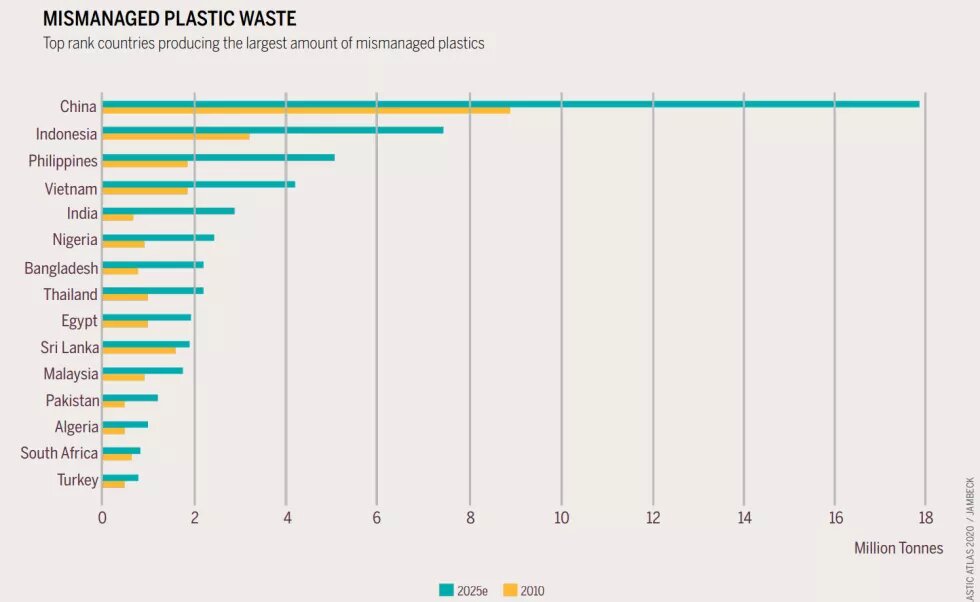
The lack of effective policy frameworks is the main challenge in managing Nigeria’s plastic waste crisis. Until this gap is filled, the damages caused by plastic pollution currently experienced in the country will continue.

Reliable statistics on the volume of plastic waste produced in Nigeria are difficult to obtain. Figures from the Lagos Waste Management Authority (LAWMA) estimate that Nigeria generates 35 million tonnes of municipal solid waste annually, out of which 10 to 15 percent is composed of plastics, pointing to a growing environmental problem and the challenging task for government to find effective solutions.
In 1988, the Federal Government of Nigeria took steps to safeguard the environment by establishing the Federal Environmental Protection Agency (FEPA) Act; thereby making Nigeria the first African country to establish a national institutional framework for environmental protection. Though there were regulations that included the plastic material and synthetic industry, these were focused on only limiting their effluents, emissions and discharge of hazardous substances. However, FEPA was unable to enforce its own regulations and was merged with other relevant ministries to form the Federal Ministry of Environment in 1999.
To address the need for effective enforcement of environmental laws and regulations, the Federal Government of Nigeria in 2007 repealed the FEPA Act and created the National Environmental Standards and Regulations Enforcement Agency (NESREA) as a parastatal organisation under the Federal Ministry of Environment.
So far, the Extended Producers Responsibility (EPR) programme of NESREA has been the closest working government policy tackling plastic waste in Nigeria - a programme that originated from Sweden in the 1990s as a policy strategy to encourage environmentally responsible product manufacturing and disposal. NESREA first published its EPR operational guidelines in 2014 and commenced operation in 2016 starting with the sector that probably produces the largest amount of plastic waste in the country - the food and beverage industry.
Responsibility (EPR) programme.
The EPR seeks to provide a framework for collaborative partnerships between government and the private sector towards achieving zero waste. The idea is to make manufacturers or brand owners responsible for the entire lifecycle of their product, particularly their take-back, recycling and final disposal; a process which is collectively managed through third-party organisations called the Producers Responsibility Organizations (PROs), such as the Food and Beverage Recycling Alliance (FBRA).
Presently, ten companies are registered under the FBRA. However, many manufacturers responsible for plastic waste generation have been slow to sign-up to the alliance. To start with, the standards and capabilities of the manufacturers vary greatly, and this reflects on the degree to which they can apply the EPR guidelines and put these new practices into action. Also, there is the problem of a lack of understanding of how the policy is to be implemented due to inadequate information and poor communication between the government and the industry. The definition and classification of the stakeholders’ roles and responsibilities remain unclear, and the economic costs and incentives of the programme have not been determined. Most significantly, insufficient funds for monitoring and enforcement have weakened the process. Nonetheless, the PROs continue to work with small community-based vendors through partnerships to carry out engagement and advocacy, collection and recycling activities.
Another attempt to regulate the mounting problem of plastic waste was made in 2018, when a member of the House of Representatives introduced the Plastic Bags (Prohibition) Bill. The bill sought to prohibit the use, manufacture and importation of all single-use plastic bags used for commercial and household packaging. It also prescribed heavy penalties for offenders, including of imprisonment. Although the House of Representatives passed the bill in 2019, it was never signed into law.
The National Policy on Plastic Waste Management is the most current and comprehensive effort to promote the sustainable use of plastic through life cycle management. It builds on the National Policy on the Environment of 1991 and the 2018 National Policy on Solid Waste Management that was developed to govern the waste sector. The policy, which continues to be under consideration since 2018, aims, among other things, to reduce plastic waste generation in the environment by 50 percent of its baseline figure of 2020 by 2025, to phase out single-use plastic bags and styrofoam by 2028, and to ensure that all plastic packaging in the market is recyclable or biodegradable by 2030.
In all, despite some efforts by lawmakers and the Nigerian government, the necessary reforms are beleaguered with a lack of political will to follow through and confront the plastics crisis.
This is a chapter from the Plastic Atlas Nigeria.
